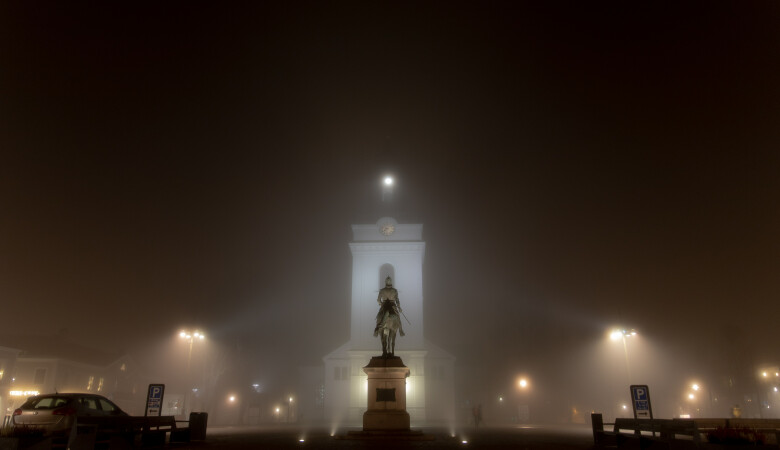Confidence in Christ's Righteousness (Romans Sermon 72 of 120)
July 10, 2005 | Andy Davis
Romans 9:30-33
Imputed Righteousness
Introduction: On What Are You Basing Your Confidence?
It is wonderful to be back here with you, a delight to be able to share the Gospel with you again, and to talk about Romans. And I feel a special sense of freedom today, in that there are no notes here. Usually I have an extensive outline that I'm kind of enslaved to follow and I'm just totally free this morning. So I can do anything. You have no idea what I'm going to preach on but you know I'm probably going to be preaching on Romans 9:30-33. So that binds me already. But we had to get the bulletins to the printer before the Fourth of July Holiday. And so you have plenty of room to write down notes.
We are looking at some incredible verses, Romans 9:30-33, and as we do, I want to come at it from the perspective of one of these incredible moments, a key moment in redemptive history, in the Old Testament. One of the most, in my opinion, one of the most exciting encounters that ever happened in the Old Testament. And that was when the king of Assyria sent his army to besiege Jerusalem in the time of King Hezekiah. And we're going to come back and try to understand what happened at that moment. But at that moment, the field Commander of the Assyrian army stood there, filled with pomp and arrogance and had no idea why the Jews weren't coming out of the walled city, the fortress of Zion, Jerusalem because Assyria is undefeated and they knew very well how to lay siege to a city and to conquer it.
All the other Judean cities had been conquered already. And here is the field commander of the King of Assyria, and he asked a fascinating question, a vital question to King Hezekiah and all the remnant of the Jews that are inside the walls of Jerusalem, and he asked this question, this is in Isaiah 36:4, the field commander asked King Hezekiah, he said, "On what are you basing this confidence of yours?"
Now, I want to take that physical or military question, and I want to lift it up to the spiritual realm. On what are you basing your confidence before a Holy God? On what are you basing your standing before God? On what are you basing your confidence as you face judgment day? That careful scrutiny in which we will have to give an account on the Day of Judgment for every careless word we have spoken. On what are you basing your confidence? That is the question that these verses seek to answer. Romans 9:30-33.
The Burning Question: What is Happening With the Jews?
Now the context in Romans 9, Paul is wrestling with a question that's near and dear to his heart, burning in his heart. The question of what is happening with the Jews? Why are so many Jews of his generation, why were they rejecting Christ, after all of those miracles, after all of the supernatural things that Christ did, after all the prophecies that He had fulfilled, why were they rejecting Christ? And he deals with that right at the beginning in Romans 9. And then he gives his primary answer. And the primary answer of why the Jews were rejecting Christ is that not all Israel are Israel. And he goes into the mysteries of the sovereign plan of God of unconditional election, that we've been seeing. God's sovereign will, he gives an answer from the heavenly realm, down, the perspective of God's sovereignty down on this question.
And he says things like this, "It does not, therefore, depend on man's desire or effort, but on God who has mercy." He says God has mercy on whom He wants to have mercy, and He hardens whom He wants to harden. So, it's a perspective and answering the question concerning the Jews, a perspective from the sovereignty of God. But now at the end, he turns and gives it also from a human perspective. And the answer he gives of why the Jews are rejecting Christ is they stumbled over the stumbling stone. They could not accept Christ.
We're going to talk about in what ways Christ was a stumbling stone to them. But then, on into Romans 10, it's more from a human perspective, of the freeness of the gospel's presentation that people have heard the gospel, that word has gone out to the ends of the world, the Jews have heard but they haven't accepted the message. And so, it's more from a human point of view, here.
II. Righteousness Essential to Salvation
Now, as we have studied in Romans 9, we've gotten into some of the deepest doctrines you're ever going to find talking about unconditional election, sovereignty of God before the foundation of the world. But I want to say to you this: unconditional election does not save a single sinner. Let me say that again. Predestination or unconditional election doesn't save anyone. Every sinner must have an active and perfect righteousness before God or we will be condemned. Election does not give that righteousness to us, rather it guarantees that we will get it someday. But we must have an active and perfect righteousness before the holy eyes of God. If we do not have it, we will not be saved on Judgment Day.
Now, what is the origination of that righteousness? We've already seen it in Romans, that righteousness we stand in is Christ and its ours by faith, but we must have that righteousness. Now this is very, very difficult for us to understand and that it is just how pure and how holy are the eyes of God and how he cannot be surrounded by any imperfection. He cannot even look on evil, and therefore we must be perfectly righteous in His sight. Jesus told the mysterious parable about this in Matthew 22.
He was talking about the kingdom of heaven there and he said this,
"The kingdom of heaven is like a king who prepared a wedding banquet for his son. He sent his servants to those who had been invited to the banquet to tell them to come, but they refused to come. Then he sent some more servants and said, 'Tell those who have been invited that I have prepared my dinner: "My oxen and fattened cattle have been butchered, and everything is ready. Come to the wedding banquet."' But they paid no attention and went off-- one to his field, another to his business. 6 The rest seized his servants, mistreated them and killed them. The king was enraged. He sent his army and destroyed those murderers and burned their city. Then he said to his servants, 'The wedding banquet is ready, but those I invited did not deserve to come. Go to the street corners and invite to the banquet anyone you find.' So the servants went out into the streets and gathered all the people they could find, both good and bad, and the wedding hall was filled with guests. But when the king came in to see the guests, he noticed a man there who was not wearing wedding clothes. 'Friend,' he asked, 'how did you get in here without wedding clothes?' The man was speechless. Then the king told the attendants, 'Tie him hand and foot, and throw him outside, into the darkness, where there will be weeping and gnashing of teeth. For many are called, but few are chosen.'"
That's a parable that Jesus told, Matthew 22:1-14. Now two shocks, in the parable. First of all, the shocking reaction of the people who are invited who treated the guests, who treated those inviting them so rudely even to a point of killing the messengers, that's a shock. Clearly represents the Jews and the way they treated prophets. The second shock, however, is the king's reaction to this man he finds who doesn't have wedding clothes. Now, those of you who have been in a wedding, you know very well how expensive it is to get fully attired and properly for a wedding. If you have ever been a groomsman, or a bridesmaid or whatever, it's an expensive proposition. You've got to be dressed well. And even if you're just a guest, you need to wear your best clothes.
I've always said that weddings are one of the easiest things to crash. All you have to do is have a suit and wear it. Nobody knows everybody at a wedding, there's not one person that knows everybody at a wedding except God, God knows everybody at the wedding but nobody knows. So all you have to do is have the proper attire and you will be fine.
But this king came in and found a man who was not properly clothed. What could it be but righteousness? It's got to be that perfect righteousness that we stand before the King, and if we don't have that righteousness we'll be thrown outside to the darkness. To me, that is the meaning of the parable. And therefore, the question is, on what are you basing your confidence? What is your righteousness?
III. The Case of the Gentiles
The Gentiles had a righteousness that was by faith, the Jews rather pursued a righteousness that came by legal effort. Now, if you look at the case of the Gentiles, Verse 30, "What then shall we say? That the Gentiles who did not pursue righteousness have attained it. That is, a righteousness that is by faith."
Now, Paul says some interesting things about the Gentiles. First, he says they did not pursue righteousness. And oh, was that true! Paul is writing to Rome and Rome was a cesspool of immorality. Think about the emperor who, I think he was emperor at the time Nero, an ancient historian said that Nero prepared banquets in public places and used the whole city as his private house. So the whole city became his banqueting area. Another ancient historian, wrote about what it was like at one of Nero's feasts.
"[Nero] had a raft constructed in Agrippa's lake, put the guests on board and set it in motion by other vessels towing it. These vessels glittered with gold and ivory; the crews were arranged according to age and experience in vice. Birds and beasts had been procured from remote countries, and sea monsters from the ocean. On the margin of the lake were set up brothels crowded with noble ladies, and on the opposite bank were seen naked prostitutes with obscene gestures and movements. Nero who polluted himself by every lawful or lawless indulgence, had not omitted a single abomination which could heighten his depravity."
That was an ancient historian writing about Nero. Well, what was true of their feasts was also true of their religion. They would go to these, especially the mystery religions, these temples and there would be meat sacrificed to idols and there would be immorality. They lived wicked lives.
And the scripture is clear about this again and again. Ephesians 2 says that they were dead in their transgressions and sins in which they used to live, they were by nature objects of wrath. Already seen in Romans 1, these Gentiles, it says, had "become filled with every kind of wickedness, evil, greed and depravity. They are full of envy, murder, strife, deceit, and malice. They are gossips, slanderers, God haters, insolent, arrogant, and boastful. They invent ways of doing evil, they disobey their parents, they're senseless, faithless, heartless, ruthless." That's the Gentiles who did not pursue righteousness. That's the way they lived. They had no yearning or hungering or thirsting after righteousness.
It says in 1 Peter 4, speaking to Christians, "For you have spent enough time in the past doing what pagans choose to do, living in debauchery, lust, drunkenness, orgies, carousing and detestable idolatry. They think it strange that you do not plunge with them into the same flood of dissipation and they heap abuse on you." That's the way the pagans lived. So we should banish forever the idea of the noble savage, of the noble pagan, they were not pursuing righteousness. Rather they were pursuing wickedness. And frankly, we've already learned in Romans 3 that "there is no one righteous, not even one, no one who understands, no one who seeks God." So that means they're not pursuing God and they're not pursuing righteousness. Frankly, God is like someone who's an unrequited lover in Romans chapter 10, he says, "I was found by those who did not seek for me, I revealed myself to those who did not ask for me."
The Gentiles are a clear example of that. But some Gentiles attained perfect righteousness. How can it be that the Gentiles who did not pursue righteousness have attained it? They have attained a righteousness sufficient for Judgment Day. Oh, what amazing grace, what incredible grace, that the holy God would treat the Gentiles like that. Not giving them what their sin deserves, not pouring out on them the wrath that they deserve, but rather taking all that on Christ and giving them a perfect righteousness. What grace and what mercy and what righteousness do they have? They have nothing less than Christ's perfect righteousness. Born under the law, He lived a perfect life under the law of Moses. He met every jot and tittle. He obeyed every commandment. He was obedient perfectly to his parents. Never disobeyed them once. And he never disobeyed his heavenly Father. He loved the Lord his God with all of his heart, with all of his soul, with all of his strength, and all of his mind, all of his life. And he loved his neighbor as himself, perfectly, even to the point of pouring out his blood for them.
Jesus' righteousness is perfect. It was a perfect robe of righteousness, every thread put in by actual days lived by Jesus. Jesus' perfect righteousness, and that's what the Gentiles have attained. A perfect righteousness. Now, this Gospel righteousness has already been mentioned in Romans. In Romans 1:16-17, Paul says, "I'm not ashamed of the Gospel," why not, "because the Gospel is the power of God for the salvation of everyone who believes." And then in verse 17, he says, "For in the gospel, the righteousness from God is revealed, from faith to faith, as it is written, 'the just shall live by faith.'"
So, there right from the beginning, he gives us the beautiful theme of the Book of Romans and that is a righteousness that's given to us simply by faith. Something we just trust in. Christ's perfect righteousness. It says the same thing again in Romans 3:21-24, by the way, I just believe Romans 3:21-27 is the glowing heart of the Gospel. And anybody ever asks you, "What is the heart of the Gospel?" it's Romans 3:21-27. Let's only read part of it, it says, "But now, a righteousness from God apart from law has been made known to which the law and the prophets testify. This righteousness from God comes through faith in Jesus Christ to all who believe, there is no difference, for all have sinned and fall short of the glory of God and are justified freely by His grace through the redemption that came by Christ Jesus."
That is a beautiful righteousness that's just ours my faith. It's Jesus' righteousness that He bought for us at the cross. That is the righteousness by faith. This is the very way that Abraham was saved as we already learned in Romans Chapter Four. What does the scripture say about Abraham? "Abraham believed God and it was credited to him as righteousness," a righteousness that is simply ours by faith, amen. And it's in that, that I stand before you today, a forgiven man. It's in that that all of you who are my brothers and sisters in Christ stand blameless before God, forgiven people. It is a perfect righteousness that should make you happier than you look right now. So smile, rejoice because we stand in a perfect righteousness.
IV. The Case of the Jews
But what about the Jews, the case of the Jews? Not so good in these verses, verse 31-32. "But Israel, who pursued a law of righteousness has not attained it," Why not? Because they pursued it not by faith but as if it were by works. They stumbled over the stumbling stone." Now, it is hard to overstate how passionate were some Jews to the pursuit of legal righteousness. I mean, some people that's all they did all the time. They woke up and they had certain ritual washings, they had morning sacrifices, evening sacrifices. They had everything laid out that they were a bunch of box checkers. Do you know what I'm talking about? Just the day was lined up with a bunch of things they were going to do, and they check, check, check, check, check, check, check. And they have years of pages of boxes that have been checked. Of perfect, so they believed righteousness.
And not only that, but they thought God's laws were insufficient actually needed some help. So they added on some human traditions to be very clear what it meant to remember the Sabbath day and keep it holy. They added on some extra regulations like a Sabbath's day journey, which is nowhere mentioned in the Old Testament. But you have an idea of how far you can travel. It's there in Acts chapter 1, saying that the Mount of Ascension was a Sabbath's day journey from the City of Jerusalem, what is that? Well, it's what the elders had told them, that's how far you could walk without working on the Sabbath.
And so they had all of these rules and regulations, and Jesus confronted them again and again. They gave a tenth of their spices, mint, dill and cumin. I talked about this on Wednesday night. Imagine just sitting there with a microscope, nine for you, nine for me, one for you. Okay, God gets his mint leaves. God really does want his mint leaves. He has said You should have done that but you should have noticed the bigger matters of the law, justice, mercy and faithfulness, for example. Well, what of these Jews who pursue the law of righteousness, he says, they have not attained it. They have not attained it. Jesus put it this way, unless your righteousness surpasses that of the Pharisees and teachers of the law, you will by no means enter heaven. It's not enough. Why not? What was wrong with that legal righteousness?
Problems With Legal Righteousness
Three things. First of all, it was all external. It was all external. It did not touch the corruption of their hearts. Right after in the Sermon on the Mount, Jesus said that unless your righteousness surpasses that of the Pharisees and teachers of the law… He then went on to say "You have heard that it was said 'You shall not murder,' but I tell you that if you're angry with your brother, you're in danger of hell." "You have heard that it was said, 'You shall not commit adultery,' but I tell you, that if you look lustfully at a woman, you've committed adultery with in her in your heart." So he's going to the heart of the matter. That's the first problem with legal righteousness. It was external. Jesus said in Matthew 23 that the scribes and Pharisees were like whitewashed tombs, which look beautiful on the outside but inside they're full of corruption, dead men's bones and everything unclean. That was the first problem.
Second of all, this righteousness was pursued for their own pride and glory. They did it to display their own righteousness with no dependence on God. It was not by faith. And thirdly, it was not humble and honest about their failings, they were not honest to say that they had not kept the law. They thought they really had kept it. You remember the rich young ruler saying "All of these commands I have kept from my childhood." I find that remarkable, because Jesus said that one of the commands is to love your neighbor as yourself, another was honor your father and mother. So we bring in mom and dad, rich young ruler, and ask from your youth, "Have you honored Mom and Dad?"
So they thought that they had perfectly kept the law and they had not. The law did not make them righteous. And Why not? Because of how they pursued it. Look what he says in verse 32. "Why not? Because they pursued it not by faith but as if it were by works, they stumbled over the stumbling stone."
You know, they were pursuing something. They were seeking, they were, but they were not seeking God. Remember, we already learned in Romans 3, "There is no one righteous, not even one, no one who understands" listen, "No one who seeks God." So the Jews were not seeking God while they pursued righteousness, they were on their own doing it and saying, "Hey God, look at this, give me my pay, give me my reward." But it was not God they were seeking.
Look at Romans 10:3, it says, "Since they did not know the righteousness that comes from God and sought to establish their own, they did not submit to God's righteousness." So they're pursuing righteousness apart from God, it's their own thing. It's like a project they're doing and then they're going to show God, "Is this good enough?" It was not a seeking of God, it was by works and not by faith. The law does not give anybody righteousness. Let me say that again, the law doesn't give anybody righteousness any more than an MRI or a CAT scan gives health. It doesn't. It doesn't heal you, it shows you that you need healing. And that's what the law does as well. An MRI and a CAT scan show you that you have a serious health problem and you need to address it. It's another thing that comes along that does the healing. The law is a diagnostic tool that tells you, "You are not righteous enough."
Romans 3:20 says, "Therefore, no one will be declared righteous in His sight by observing the law, rather, through the law we become conscious of sin." The law was meant to bring us to Christ. Romans 10:4, which we'll get to, God willing, next time, "Christ is the end of the law so that there may be righteousness for everyone who believes." Friends, it's not those who achieve, it's those who believe. It's not works of the law that's going to enable us to stand before this holy God, it is simply by faith.
V. They Stumbled Over the Stumbling Stone
So these Jews, it says, stumbled over the stumbling stone. "As it is written," verse 33, "Behold, or see, I lay in Zion a stone that causes men to stumble, and a rock that makes them fall. And the one who trusts in Him will never be put to shame." Now here, Paul is reaching for the Old Testament, he's reaching for quotation from Isaiah, actually two. He conflates two quotations, Isaiah Chapter 8, and Isaiah 28, and they both teach the same thing.
Let me tell you the situation in Isaiah 8. In Isaiah 8, God was telling Israel, telling Judah really, that He was bringing the Assyrians as an act of discipline for the fact that they had broken the law. So the Assyrians are coming. Now, the Assyrians were like the Nazis of the ancient world, they invented crucifixion, they were a terrifying people. And the message that the Assyrians was coming went out to pagan and to Jewish nation alike. All of those small kingdoms like Edom and Aramea, all these, they heard the Assyrians were coming, there's nothing they could do about it.
And so what Isaiah says is, in Isaiah 8, 9 and 10, "Raise the war cry you nations, and be shattered. Listen, all you distant lands. Prepare for battle, and be shattered. Prepare for battle and be shattered. Devise your strategy, but it will be thwarted. Propose your plan, but it will not stand." Why not? Because the Assyrians are going to win. So go ahead and put your armor on, go ahead and fill the sand bags, go ahead and get ready for battle, sharpen your spears and your swords and get ready, and then go die, because the Assyrians are going to win. But the message to the godly remnant in Judah was this, "Don't do all that. Don't do all that. Focus on your relationship with God, God is the issue here, not the Assyrians."
And so it says in Isaiah 8:12-15, "Do not fear what they fear. Do not dread it. The Lord Almighty is the one you are to fear. He is the one you are to dread, He is the one you are to regard as holy, and He will be a sanctuary." In other words, He is the place of refuge where you will survive the Assyrian onslaught. "He will be for you a sanctuary, but for both houses of Israel, He will be a stone that causes men to stumble, and a rock that makes them fall. And for the people of Jerusalem, He will be a trap and a snare. Many of them will stumble. They'll be fall and be broken, they will be snared and captured."
Now, here's the mystery. How does one God at the same time be both a sanctuary and a stumbling stone? Well, the whole thing came down to the attitude of the people as they faced the Assyrian threat. He put it very plainly in Isaiah 7:9, write that one down, it's one of the key verses. Isaiah 7:9 says, "If you do not stand by faith, you will not stand at all." And that is true of the Assyrian invasion in Isaiah's time, and it's true of Judgment Day in the future. If you do not stand by faith, you will not stand at all.
Now, what is the lesson here? You can't save yourself, that's the stumbling stone. God Himself stands before you and says, "You cannot save yourself. In the Assyrian case, they're too strong for you, they will wipe you out. In the case of Judgment Day, your efforts, your strategy, you're putting on your armor and going out and trying every day to be a better person, it will not succeed. You will not succeed."
But if like godly King Hezekiah, you put on sack cloth and you lay down on your face and you beg God for forgiveness, and you ask Him to save you, He will be, for that kind of a person, a sanctuary. And that will highly motivate God to send out the Angel of the Lord. And in one night wipe about 185,000 Assyrian troops. Now, up until this week, I thought it was 'an' Angel of the Lord, it's 'the' Angel of the Lord. Do you know who 'The Angel of the Lord' is? The same one that appeared to Moses in the flames of the burning bush. It is the one who said to Samson's parents, "Why do you ask me my name? It's beyond understanding." It is the second person of the Trinity, He sent out Jesus. And in one night, 185,000 Assyrian troops were wiped out.
And who was with Jesus when he did it? No one. Who gets the credit and the glory? He does. Who gets to be safe? Hezekiah and the remnant inside the walls. Are they going to be boasting about what they did in their strategy? No. God gets the glory, they get the joy. God gets the glory, and they get delivered. But if they say, "Hey, we can take on the Assyrians, they will die." And so Paul chooses a perfect Scripture to say why it was that the Israelites were dying, because they didn't trust in Christ, they thought they could do it on their own. They thought they could face the onslaught of their own sin, and face the onslaught of Judgment Day, just like the Jews thought they could face the onslaught of the Assyrians, and they couldn't. They stumbled over the stumbling stone.
Now, how is Jesus a stumbling stone? Jesus is a stumbling stone, and I think He was in three senses. First, He was a stumbling stone in His person. Secondly, He was a stumbling stone in His message. And third, He was a stumbling stone in His death. First in His person, in that He was God in the flesh, virgin born, He was God almighty in human form, and they could not accept that. They couldn't accept the doctrine of the incarnation, that He could be both son of man and son of God at the same time. That was offensive to them. It was a stumbling stone. And so in John chapter 10, Jesus said, "I've shown you many good works from the Father. For which of these are you stoning Me?" "Not for any of these, but because you, a mere man, claim to be God." That's offensive. It was blasphemous as far as they were concerned.
Secondly, His message was offensive. You know what His message was? "Unless your righteousness surpasses that of the Pharisees and teachers of the law, you will not be saved." "Nicodemus, you must be born again." Luke... He says in Luke 13, "Do you think all those Galileans who died when Pilot killed them were worse sinners than all the others? No, I tell you they're not, because frankly, unless you all repent, you will all likewise perish." That's offensive. Your righteousness is not enough, you're heading toward Hell, you're on a broad road to destruction, that is unpopular. And the Scribes and Pharisees hated it, they hated that message.
But of all of it, the worst of all was that He died on a cross. That was so offensive. He was supposed to be the King of the Jews, He was supposed to be the son of David, He was the Messiah. And here He is losing to the Romans in the worst possible way, shamefully dying on the cross, His blood poured out. Oh, how offensive that was. And so Paul says very plainly in 1 Corinthians 1:23, "We preach Christ crucified, a stumbling block to the Jews." Paul will tell you personally why it was a stumbling block for him, because it says very plainly in the law, everyone who's hung on a tree is under a curse from God. And they could not imagine a Messiah who was cursed. That was offensive to them. And so Jesus was a threefold stumbling block to the Jews.
VI. Everyone Who Trusts in Him Will Never Be Put to Shame
But anyone who trusts in Him will never be put to shame. It was not for all the Jews that He was a stumbling stone, but for some Jews He was a sanctuary. For some Jews, He was a savior. And so it says, "Everyone who trusts in Him will never be put to shame." This is the majestic promise of the Gospel. I actually believe with all my heart that shame is one of the things we fear the most.
Yesterday Christie and I and the kids were listening to a speaker, Chris Myers, I think it was. And he said that when they made a list of the top 10 fears in America, you know what the number one fear was he said? Public speaking. Death was number three. And I thought, "No, I'd rather public speak than die, myself." But for some... And I respect those that get up and give their testimony, but they don't have the gift of public speaking and all that. I've had a number of people at Baptism say, "Do I need to get up in front of all those people and give my testimony?" "Yeah, you do, you do. But God will give you help." It's not an easy life, the Christian life. And so this is a challenge, but He'll help you, and He always has been faithful.
But people are afraid of it. You know why? Because they're afraid of being publicly shamed. I confess to you openly and candidly, it's on my mind every Sunday. I desire the protection of God. I don't want to be put to shame. Have you ever seen in the local news when some guy is moving from the court room to a waiting car and he's got his coat over his face? Why is that? Because he doesn't want to be ashamed. I think it's one of the things that we fear the most.
Look at the promise in Romans 9:33, "Everyone who trusts in Him [Christ] will never be put to shame." Freedom from shame, freedom from the sin that causes shame, freedom from judgment day shame. And there is no shame greater than that one, to have God Almighty say, "I never knew you. Away from Me you evildoers." Oh, what shame that will be. But if you trust in Christ, and not in your own works' righteousness, you will not be put to shame. He will welcome you. "Enter into the joy of your master," He will say. And so you may feel ashamed because of your sin. It's the first thing that Adam and Eve felt, wasn't it? The first thing was shame, as soon as they sinned.
Christ came to take our shame away. Isn't that a sweet message? Everyone who trusts in Him will never be put to shame.
VII. Application
And what application can we take from this passage? Well, may I say to you that for all of us a far sterner test than the Assyrian invasion is coming. It's called Judgment Day. And it hasn't happened yet, but I tell you this, I stand before you unafraid of that coming judgement. You know why? Because I'm trusting in Christ and not in my own righteousness.
Ask yourself a diagnostic question, "What are you trusting in?" On what are you basing your confidence at that encroaching Judgement Day? Is it because you're basically a good person? Is it because you've been a Baptist all your life, or because you go to church or do a bunch of good things? Do not look inwardly, but trust in Christ and in His perfect righteousness, the only thing that's going to survive. And for yourself, can I tell you, I just urge you to do this, look in the mirror, if you're a Christian, look in the mirror and say, "I am as perfectly righteous right now as Jesus Christ by faith. And based on that strong platform of perfect righteousness, I'm going to fight sin in my life so that my performance will be, as much as possible, perfect too." And it won't be, not in this life, but you stand in a perfect righteousness already. It says it right there in Romans 9:30. The Gentiles have attained righteousness by faith.
And so we stand in there in a perfect righteousness. Now look around, look at a world that would bomb a bunch of innocent people in London for political reasons. Look at the world you know, the world of your neighborhood, the world of your office, and ask, "What are those people basing their confidence in? What are they trusting in? That there won't be a Judgment Day?" Well, that's a vain hope. God said there would be one. Well, then that they're basically good people? Well, the Scripture testifies to that one quite plainly. Are they trusting in Christ, and in Christ alone? If not, Romans 10 says, and we'll get to it, God willing, in due time, you and I have a responsibility to tell them the Gospel of Christ, so that they will learn simply by faith to trust in Him for their righteousness. Close with me if you would in prayer.






























